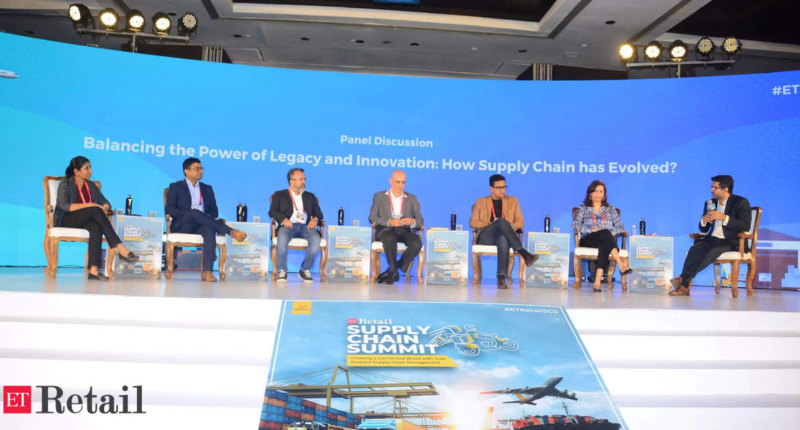E-commerce leaders at the ETRetail Supply Chain Summit emphasized that technology and last-mile delivery are crucial for driving e-commerce growth. They advised organizations to focus on leveraging technology, inventory management, and last-mile delivery to meet the evolving customer needs in the e-commerce space. Additionally, supply chain leaders need to understand and appreciate the difference between the cost of supply chain and the value it brings to the table to succeed in the e-commerce space. Experts also noted that in the post-COVID era, e-commerce growth has stagnated, and virtual and augmented reality will be essential technologies that allow customers to feel and touch products to achieve the next level of e-commerce growth. The supply chain ecosystem is evolving, and companies need to adapt to changing customer expectations to succeed in the e-commerce space.
Supply chain leaders at the ETRetail Supply Chain Summit held in Mumbai earlier this month, have highlighted the importance of technology and last-mile delivery for e-commerce growth. The panel discussion was centered around how the supply chain has evolved with a focus on balancing the power of legacy and innovation. The leaders advised companies to leverage technology, inventory management, and last-mile delivery to drive e-commerce growth.
Shaik Asad Parwez, head – logistics & warehousing, V-Guard Industries, noted that e-commerce is a big opportunity for brands. He said that every mobile phone owner is a potential customer, and with the rise of e-commerce, it has become easier to reach them. He emphasized the importance of leveraging digital technology to tap into this market.
Saiba Suri, country customer fulfillment manager at IKEA India, was also part of the panel discussion. She shared that e-commerce has boomed for IKEA India and has seen steady development over the last 2-3 years. Suri also highlighted that along with e-commerce, supply chains have had to navigate challenges such as order orchestration for large ticket items and complex furniture, and inventory management.
The leaders acknowledged that e-commerce has been a boon for the retail sector and encouraged brands to focus on technology, inventory management, and last-mile delivery to drive growth. The power of digital technology and increased mobile phone usage has made it easier to reach potential customers, making e-commerce a big opportunity for brands. The leaders also recognized the need for supply chains to evolve and adapt to changing customer needs and expectations in the e-commerce space.
Ashish Bansal, VP – customer service and logistics, Colgate-Palmolive, shared his thoughts on the rise of e-commerce and omnichannel. He emphasized that the basic expectation of a customer from a supply chain is to get the right product at the right time. However, with the growing need for transparency and faster delivery, the speed of delivery has become a significant factor. Customers today seek customization and this is where omnichannel comes in, he stated. Bansal added that supply chain partners must be trusted to achieve innovation and visibility.
Neha Parekh, director-supply chain, Nivea India, highlighted the challenges the supply chain industry currently faces. Apart from normal deliveries, the supply chain is expected to deliver resilience, which is a good step change. Parekh commented that it is heartening to see the support that the supply chain function is receiving from the ladder organization. She acknowledged the development in the supply chain ecosystem, and expressed that the industry is in a good place.
According to Samrat Sehgal, head of supply chain at Dabur India, e-commerce witnessed significant growth during the pandemic due to its safe delivery model. However, in the post-COVID era, growth has stagnated, and it is expected to be around 10-15 per cent, rather than the earlier 50-60 per cent growth recorded by organizations. Sehgal added that to achieve the next level of e-commerce growth, technology advancement will play a crucial role, with virtual and augmented reality being important technologies that allow customers to feel and touch products.
Vivek Gaurav, author, ‘Happiness’ Speaker, and director of operations at Cipla Health, commented on the changing landscape of last-mile delivery with the growth of e-commerce. He highlighted the need for supply chain leaders to understand and appreciate the difference between the cost of supply chain and value it brings to the table. Gaurav emphasized that mindset changes are key for supply chain leaders of traditional businesses to succeed in the e-commerce space.
In conclusion, e-commerce growth has stagnated in the post-COVID era, and technology advancement will play a crucial role in achieving the next level of growth. Virtual and augmented reality will be essential technologies that allow customers to feel and touch products. Moreover, supply chain leaders need to understand and appreciate the difference between the cost of supply chain and the value it brings to the table to succeed in the e-commerce space.
Don’t miss interesting posts on Famousbio









